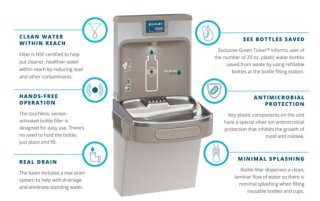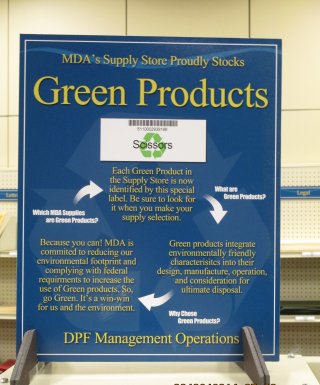Highlighted Success Stories
On this page:
- Department of Veterans Affairs (VA) Caribbean Healthcare System, San Juan, Puerto Rico
- James E. Van Zandt VA Medical Center, Altoona, Pennsylvania
- Missile Defense Agency, Fort Belvoir, Virginia
Department of Veterans Affairs (VA) Caribbean Healthcare System, San Juan, Puerto Rico
Incorporating sustainable practices into daily operations has made Veterans Affairs Caribbean Healthcare System (VACHS) a leading facility in environmental programs nationwide. Despite the challenges the healthcare community faced in 2020, VACHS’ dedication to environmental sustainability and quality healthcare services did not diminish. In 2020, VACHS made the following sustainability efforts:
- During the COVID-19 pandemic, the laundry service team made over 4,000 reusable face masks for employees with approximately 250 pounds of reused fabric.
- In March 2020, the facility replaced polystyrene food trays with cardboard, and approximately 10,492 cardboard trays were used and recycled in fiscal year 2021.
- The facility increased its Electronic Product Environmental Assessment Tool (EPEAT)-registered purchases to 2,115 units, a 91 percent increase from previous years’ EPEAT-registered purchases. The facility purchased EPEAT-registered monitors, CPUs, and laptops. In addition, VACHS donated 63 tons of electronics, a 12.5 percent increase from fiscal year 2019.

- The facility decreased the amount of paper purchased by 24 percent compared to fiscal year 2019.
In 2020, Veterans Affairs Farming and Recovery Mental Health Services (VA FARMS) launched a pilot program, Boosts for Food, which uses green therapy to help veterans cope with mental and physical ailments. Since March 2020, this program has offered online trainings focused on horticulture and sustainable agricultural practices. Veterans were eventually able to continue with in-person courses, constructing a small-scale greenhouse and vertical planting columns with materials from their homes, which saved over $50,000 in materials. The program has helped veterans to focus their energy in a positive environment, as well as learn about composting, recycling, and reusing materials.
James E. Van Zandt VA Medical Center, Altoona, Pennsylvania
The James E. Van Zandt (JEVZ) Veterans’ Administration Medical Center (VAMC) sustainability program is derived from compliance with environmental law, executive orders, Veterans Health Administration directives, concern for the headwaters of the Chesapeake Bay, and compliance with the International Organization for Standardization. It does not establish absolute requirements for environmental performance, but it does require an organizational environmental policy to comply with applicable legal and other requirements, to prevent pollution, and to continually improve its environmental performance.
In 2020, the program improved the development of Green Teams at the grassroots level, by allowing multiple teams to address issues and encouraging independent problem solving. The facility sustainability officer also mentored additional teams on leadership and business administration.

Altoona installed new air handling units with air-to-air heat plate exchangers for the procedure clinic and infusion clinic. This system is monitored by the Trane Tracer ES system, which provides real time feedback on system performance. The program installed economizer systems with the boiler plant project to capture thermal energy and preheat water. The program also installed two stairwells with LED lights.
In 2020, the program returned its stormwater retention swale to the west side of the employee parking lot. This turned over 1450 square feet of impervious surface into a green bioswale designed to manage stormwater surge. The slow release mitigates the size and intensity of storm-induced flooding on downstream receiving waters. The program also installed 17 no-contact water faucets in the facility to encourage water consumption and reduce the number of plastic bottles used.
Achieving 50 percent waste diversion has been a great challenge. In the past, consolidating materials in a single stream made the recycling program manageable and produced enough income to promote the program. Puncturing aerosol cans and recycling the tin reduced the cost of processing hazardous waste. The program paid for hazardous waste disposal of this waste stream early this year and is establishing a new area in the parking garage. The market for certain materials, as well as tariffs on plastics, have made waste diversion more difficult and costly. A new Neptune fluid management system has significantly reduced regulated medical waste. JEVZ purchased 90 percent recycled material external trash cans with specific messaging for its veteran population. JEVZ also purchased hoppers and a trailer to consolidate materials and improve recycling opportunities.
Missile Defense Agency, Fort Belvoir, Virginia
The Missile Defense Agency (MDA) is an active participant in EPA’s Federal Green Challenge and a recipient of the Global Electronics Council’s (GEC’s) Electronic Product Environmental Assessment Tool (EPEAT) Purchaser Award for acquiring sustainable electronics and office supplies. Participation in these programs has reduced MDA’s operating costs, resource consumption, and waste generation, and increased employees’ understanding of sustainable acquisition.

MDA’s goal is to ensure 95 percent of new contract actions (with the exception of weapon systems acquisitions), are energy- and water-efficient; U.S. Department of Agriculture-certified; biobased; non-ozone-depleting; or use recycled, nontoxic, or less toxic ingredients while still meeting performance requirements.
By ensuring 95 percent of all electronics purchased are at least rated EPEAT silver, the GEC estimated that MDA’s sustainable electronics program saved approximately $56,000 in 2020. These savings resulted from reducing electricity use by 1.31 million kilowatt-hours, water use by 779,883 gallons, and solid waste disposal by 68,566 pounds. MDA also conserved over 33,575 pounds of primary materials and reduced greenhouse gas emissions by 281,712 kilograms of CO2 equivalent, which equates to taking about 60 passenger cars off the road.
MDA also purchases between $1.3 and $2 million of sustainable goods and services each year using government purchasing cards. MDA has increased its purchase of green goods and services from 91.8 percent in 2015 to 96.5 percent in 2020.
MDA has also reduced office paper use since 2015 by implementing double-siding printing and replacing the “print” button with a “submit” button for most of MDA’s electronic forms. MDA also implemented Common Access Card-enabled network printing, where employees must use their cards in order to print. In the first year alone, this resulted in a 30 percent reduction in pages printed and over $1 million in savings. In addition, MDA centralized the purchasing of white office paper to maximize the acquisition of recycled content paper; MDA recycled over 30 percent of the content.
Although changes in employee behavior due to COVID-19 attributed to some of the printing reductions in 2020, MDA has reduced its overall consumption of office paper by approximately 59 percent since 2015.
